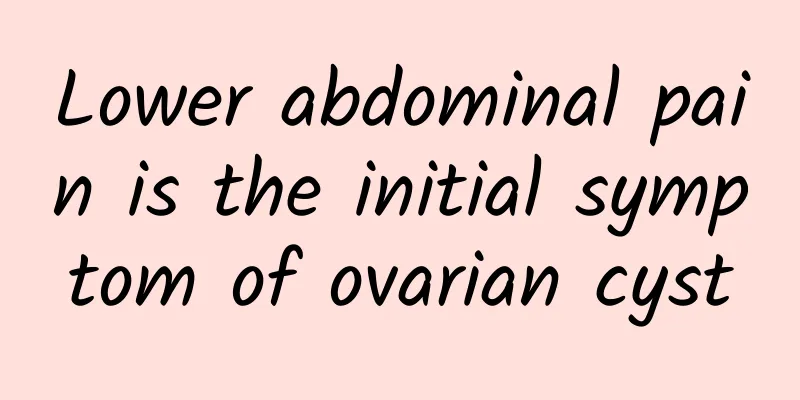Not all PID symptoms are the same!

|
Do you know the symptoms of pelvic inflammatory disease? Pelvic inflammatory disease can cause great harm to female friends, and different types of pelvic inflammatory disease have different symptoms. So, what are the specific symptoms of pelvic inflammatory disease? In response to this question, let's ask an expert to introduce the symptoms of pelvic inflammatory disease to you. Acute pelvic inflammatory disease refers to acute inflammation of the female internal reproductive organs and the surrounding connective tissues and pelvic peritoneum. The symptoms of pelvic inflammatory disease can be limited to one part or several parts can be affected at the same time. Common pathogens are Staphylococcus, Streptococcus, Escherichia coli, anaerobic bacteria and sexually transmitted pathogens, such as gonococci, mycoplasma, chlamydia, etc. It is caused by spreading to the pelvic cavity through the lymph, blood or directly. Typical symptoms: fever, lower abdominal pain that refuses to be pressed, and a large amount of leucorrhea that is purulent. Symptoms of pelvic inflammatory disease may be accompanied by fatigue, low back pain, and menstrual disorders. In severe cases, high fever, chills, headache, and loss of appetite may be seen. If there is peritonitis, digestive system symptoms such as nausea, vomiting, and abdominal distension may occur. Chronic pelvic inflammatory disease refers to chronic inflammation of the female internal reproductive organs and the surrounding connective tissue and pelvic peritoneum. The scope of chronic pelvic inflammatory disease is mainly limited to the fallopian tubes, ovaries, and pelvic connective tissue. Common types include: the symptoms of pelvic inflammatory disease are salpingitis, hydrosalpinx and tubo-ovarian cysts, and chronic pelvic connective tissue inflammation. The diagnosis of chronic pelvic inflammatory disease is based on medical history, symptoms and signs. The symptoms of pelvic inflammatory disease can generally make a diagnosis. Typical symptoms: The main clinical manifestations are menstrual disorders. Symptoms of pelvic inflammatory disease include menorrhagia, oligomenorrhea or amenorrhea; due to pelvic inflammation and adhesions, there may be varying degrees of increased leucorrhea, waist and abdominal pain, lower abdominal pain, etc. Symptoms of pelvic inflammatory disease such as chronic adnexitis can be touched. If left untreated for a long time, it is easy to cause female infertility. The systemic symptoms are mostly not obvious. Sometimes there may be fever, night sweats, fatigue, loss of appetite, weight loss, etc. Sometimes there is only fever during menstruation, and fatigue is prone to a long course of disease. Some patients may have symptoms of neurasthenia. The above is an introduction to the symptoms of pelvic inflammatory disease, which are not all the same. It is for your reference only. If you have the above symptoms of pelvic inflammatory disease, do not delay treatment. Please go to a regular hospital for treatment in time. In addition, if you have any questions about the symptoms of pelvic inflammatory disease, please consult an online expert! Pelvic inflammatory disease http://www..com.cn/fuke/pqy/ |
<<: Are you sure about the clinical manifestations of cervicitis?
>>: Experts explain the causes of dysmenorrhea
Recommend
What should we do to prevent vulvar leukoplakia?
The cause of vulvar leukoplakia is related to cha...
What are the symptoms of irregular menstruation
Irregular menstruation is a common gynecological ...
What are the causes of acute adnexitis?
What are the causes of acute adnexitis? Adnexitis...
Pros and cons of drug treatment for uterine cysts
Traditional Chinese medicine treatment of uterine...
What medicine to take for uterine fibroids and adenomyosis? Diet for uterine fibroids and adenomyosis
Uterine fibroids and adenomyosis are common gynec...
Will cervical erosion affect pregnancy? 4 advantages of minimally invasive surgery for cervical erosion
Will cervical erosion affect female conception? C...
Can you get pregnant with endometriosis?
Endometriosis can affect pregnancy, but it is not...
Care after surgery for Bartholinitis
Bartholinitis is a common gynecological disease. ...
Can you drink brown sugar ginger tea after abortion? Pay attention to 3 things in your diet after abortion
Many couples do not take necessary contraceptive ...
The effect of psychological guidance on preventing functional uterine bleeding in adolescence
Women are more susceptible to various factors tha...
What are the effects of uterine effusion on women?
In the eyes of many women, uterine effusion is co...
Prevention of candidal vaginitis starts with eliminating the cause
Candidal vaginitis is a common gynecological dise...
Can uterine malignancy be cured? Generally, it can be cured.
Patients can be cured if they actively treat uter...
What are the symptoms of mild cervical erosion? If there are 3 symptoms, it may be mild cervical erosion
There are three symptoms of mild cervical erosion...
Want to eat snacks but afraid of getting fat? DIY crispy cereal made with protein powder and oats! Sprinkle with nuts for a refreshing and delicious taste
The crunchy cereal made with protein powder and o...









